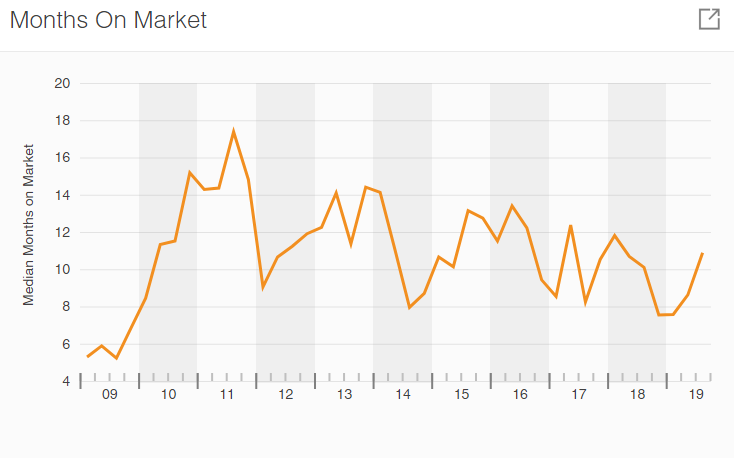 Wall Street is flirting with reclaiming record highs, but a rocky ride may be ahead as stock volatility has been 25% higher in October on average since 1928 according to Goldman Sachs.
Wall Street is flirting with reclaiming record highs, but a rocky ride may be ahead as stock volatility has been 25% higher in October on average since 1928 according to Goldman Sachs.
The U.S. Treasury market is flashing a classic recession signal called the “inverted yield curve.” This is where short term rates (3 months to 2 years) are at a higher rate than 10 year or 30-year rates (no reward for long term risk!). There have been 12 recessions since the end of WWII and seven of them were proceeded by an inversion of the yield curve. Will this time be different? Maybe. Thanks to negative bond yields (yes, investors are paying someone to take their money!) in Germany and Japan foreign investors are buying more U.S. Treasuries which drives those rates down. In the meantime, our economy is plugging away at a 2% GDP growth rate. So, let me get this right, our economy is chugging ahead, and we have an abundance of people wanting to invest in our country – what could be wrong? However, I think it would be safe to say this has been the longest, weakest recovery in history – economic prosperity has never been so poor! (Quickly, let’s put to rest the myth that the longer the recovery goes, the greater the likelihood of a recession. Recoveries don’t stop because of length!)
My concern continues to be, not interest rates, but instead the reduction of the balance sheet (debt reduction). I think debt reduction is great, but it comes with pain just like interest rate hikes. I think the Fed raising rates and reducing the balance sheet is an unwise two-variable experiment. If you assume as Morgan Stanley does, every $200B of balance sheet reduction is equivalent to another .25% rate increase.
San Diego’s August jobless rate hit 3.4%. That is lower than the 3.6% in July and 3.5% last August. It is also lower than 4.2% for the state and 3.8% for the Nation.
The most jobs were added in government followed by business services (architects, research, etc.) and construction – a good sign for housing and infrastructure.
Speaking of service businesses and government, California Senator Robert Hertzberg is proposing to expand the sales tax to services (initially 5% now pared down to 2%). This would be levied on all business to business transactions – we’re talking accountants, lawyers, broker commissions, architectural drawings, etc. Enough already!
A couple of observations from my trip to France (yes, I finished the marathon, drank fine wine and ate amazing food!). Having a strong dollar sure made things more affordable. As many of you know it is common practice not to tip in Europe. Did you know that tipping came out of reconstruction and slavery? The railways did not want to pay the former slaves who were porters and wait staff, so they encourage tipping instead. What hit me was that without sales tax and a tip, my bill was regularly 30% less than I expected. So, despite France being “expensive”, I found the bottom line to be equal or less many times. So, are we reaching a “tipping point” in the U.S.? With restaurant owners facing $15 per hour wages plus tips in the front of the house, is there now unequal pay between the front and back of the house? Will automation replace labor? Finally, the restaurant business is facing the battle of convenience vs. experience. Do you want it on your doorstep or like “Cheers, where everyone knows your name.”
Nick’s Numbers
Hi all, to piggyback on a couple of things my Dad mentioned. There was a great article in USA TODAY by Ken Fischer about whether America’s massive debt will doom us.
Here is a link https://www.usatoday.com/story/money/columnist/2019/09/22/debt-debt-doom-america/2384550001/ .
On the topic of restaurants, almost all the numbers are positive (rents, vacancies, etc.), but the chart below (months vacant restaurants are on market) may be a hint of the future.

Please give me a call or email me if you would like more in-depth info (like a property valuation or analysis). Nick Zech, 858.232.2100, nzech@cdccommercial.com ). ~ Nick
Well as we head into a busy October, keep your eyes open for tipping points. I don’t like to re-use stories but this one is a classic and way to apropos so forgive me…
There was this elderly man who had a profitable little business selling hot dogs on a busy street corner in a major city. He wasn’t particularly well educated, but he sold great hot dogs and his customers loved him.
During the early morning rush hour, he’d wheel his mobile hot dog stand to position it near the exit of the central railway station in town. A year ago, he’d added a bacon and egg roll to his range and sold scores of them to this breakfast crowd every day. At lunchtime, he’d move his stand to a popular park where he had lines of regulars.
In the afternoon he’d be back at the station entrance and then later most nights he knew a great spot near a nightclub where patrons rushed him off his feet. He had even installed special lighting and a flashing neon sign. Even people driving by would stop.
He’d worked hard for years arid done well enough to put his only son through university who later became a management consultant with a large firm.
One day his son warned him that a recession was on the way. The old man asked his son what this meant. Being an educated man, his son gave a very detailed explanation of how the recession would severely impact every person in the community, particularly small business people like his father. There would be enormous unemployment; people would not be able to afford to spend money as they did now. He painted a gloomy picture of the future and warned his father that it would be wise to cut back on his expenses and “tighten his belt” financially and prepare for the worst. The old man didn’t know much about the economy or interest rates, but he trusted his son. After all, he was an educated man. Recession mentality kicked in …
The old man began to cut back on the number of sausages and bread rolls he bought. He didn’t want to get caught with stale rolls as business began to drop off. But it was hard to judge and some days he ran out of sausages and rolls earlier than he normally would. So, he went home early and spent more time worrying about this recession that was coming.
Soon he knew that what his son had said was right. He noticed that his takings were indeed falling. This depressed him more and so he tended to get out of bed later each day. After all, why get to the station so early when obviously more people would be eating at home rather than spending money on breakfast in the city. He decided that his bacon and egg rolls were too expensive for most people now. After all, they were twice the price of a hot dog, so he cut them from his menu and his sales continued to plummet.
Wow, his son was right, this recession was hitting hard!
He decided to save more money and not replace the batteries that powered his neon sign and lights at night. Now because he was in the dark, fewer people bought from him and soon he decided that it wasn’t even worth his time setting up at night. Eventually, he decided to sell off his equipment and his trolley. He was in luck though because the woman who bought his trolley didn’t seem to know how bad business was, or how severe the recession was going to be. He managed to unload the trolley for more than he thought he would get. Now day after day he stayed at home, depressed, and occasionally his son would visit him and they would discuss how bad the recession was, and how lucky the old man had been to have an educated son who had warned him in advance about this terrible recession.
So what’s the moral of this story?
Recession mentality starts in one’s own head. If you believe that a recession is coming and that times will soon be tough, then they will be for you. Like the old man in the story, you’ll start to change your successful behavior patterns and replace them with less resourceful habits. You’ll sleep in later. You’ll take longer lunch breaks, make fewer phone calls, generate less e-mail, and go home earlier.
But it needn’t be that way …
